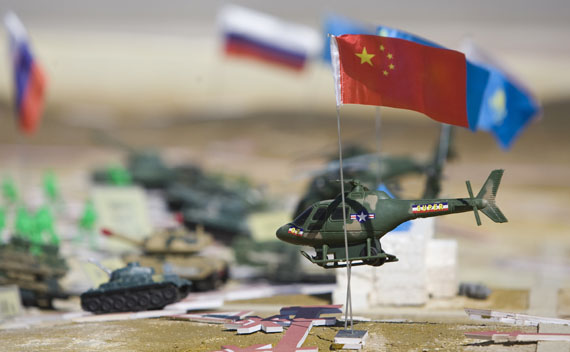The SCO at 10: Growing, but Not into a Giant
More on:

The Internationalist spent last week in Beijing, where Chinese officials were feverishly anticipating Wednesday’s tenth annual summit of the Shanghai Cooperation Organization (SCO) in Astana, Kazakhstan. But their excitement may be premature; considerable hurdles of internal rivalry and foreign reticence to cooperate with the SCO may stymie its emergence as a major regional institution.
The SCO began in 2001 as a successor to the Shanghai Five group with the limited agenda of promoting confidence-building and ensuring regional security in Central Asia among China and Russia (clearly in the drivers’ seat) and the republics of Kazakhstan, Kyrgystan, Uzbekistan, and Tajikistan. Over time it’s also acquired four “observer” states—India, Iran, Mongolia, and Pakistan—and two “dialogue partners”—Belarus and Sri Lanka, and its activities and aspirations have expanded considerably.
It’s become a broader forum for a range of security, political, and economic issues, from drug trafficking to trade, as well as for expressing anti-U.S. and anti-Western sentiments. Ministerial networks now link senior officials in fields from commerce and transport to culture and internal security. The SCO conducts biannual military exercises (dubbed “peace missions”), which are dominated by Chinese and Russian troops and typically simulate a response to regime collapse or major terrorist attack. The United Nations now welcomes the SCO as an observer, and ASEAN has signed a memorandum of understanding with it.
But Chinese-Russian rivalry is real, and growing. While both disapprove of the post-2001 surge of U.S. presence in Central Asia and united in 2005 to call for the elimination of U.S. military bases in the region, bilateral relations deteriorated after the Russian invasion of Georgia. The two actively compete for influence among the SCO’s weaker players, especially as China deepens economic and political presence in Kazakhstan. Furthermore, Russia and the Central Asian members are enthusiastic about India’s bid for membership, which will be considered at the 2011 Astana summit, whereas China remains lukewarm, given its growing strategic competition with India. The group will also consider creating an “energy club” at Astana, though Russia envisions a cartel that would benefit producers, while China is more interested in ensuring the security of sufficient supplies to meet its ravenous national demand.
More broadly, the two countries differ on the SCO’s primary value. China wants the organization to promote economic cooperation. Over the past decade, China’s trade with SCO members has soared seven-fold, from $12.1 billion to $90 billion. Still, Beijing remains dissatisfied with the pace of economic integration, which has been slowed by Moscow’s general reticence and Central Asian countries’ hesitance to expose their economies to Chinese competition. Russia, by contrast, values the SCO as a counterweight, and potentially even a geopolitical rival, to NATO.
After initial skepticism, the United States is increasingly willing to engage with the SCO. After the SCO issued its 2005 communiqué calling for a U.S. timeline for withdrawing from Central Asian military bases, the United States went to great lengths diplomatically “to make sure that the organization didn’t repeat that call,” as my colleague Evan Feigenbaum notes. (The United States was, however, evicted from the Karshi-Khanabad base in Uzbekistan). Although the United States was denied observer status in the SCO in 2005, Assistant Secretary of State Robert O. Blake this March expressed interest in cooperating with the organization, including on counterterrorism and counter narcotics efforts.
Still, the SCO’s emergence as a true military alliance and coherent geopolitical rival to the Western alliance seems implausible, given rivalry between Beijing and Moscow. (This will be even more so if India joins, further complicating the picture.) Accordingly, as Zhao Huasheng of Fudan University observes, the SCO will not coordinate member state strategy across Eurasia, nor attempt to influence the security architecture of the Asia-Pacific.
Close cooperation with international partners could also be deeply problematic. One of the most disturbing aspects of the SCO, from a U.S. and broader Western perspective, is its status as a caucus of authoritarian states that categorically reject universal norms of human rights and political liberty, apparently intent on cementing an “autocratic peace” in Central Asia. As the New York-based group Human Rights in China points out in a new white paper, members have repeatedly used the bogeyman of terrorism to crush internal political dissent. Like a latter-day Holy Alliance, the SCO has stood firm against any whiff of “color revolutions.” In May 2005, the body backed bloody repression by the Uzbek government in Andijon. Four years later, the SCO secretariat declared complete support for China’s crackdown on ethnic riots in Xinjiang province. For this reason, Washington should encourage Indian membership, since it would add at least one democracy—and U.S. strategic partner—to the organization.
The Astana summit will also consider Afghanistan’s application for observer status—a prospect that leaves U.S. officials wary. While Washington has repeatedly encouraged Afghanistan’s neighbors to become more involved in reconstruction efforts there, the United States has little interest in seeing that country fall into China’s orbit. Still, it seems inevitable that the SCO will expand its presence in Southwest Asia, the source of many of its non-traditional security concerns, including border security, terrorism, drug trafficking and other transnational crimes. In addition, the winding down of Operation Enduring Freedom will leave a vacuum, one likely to draw the SCO more into the region.
Viewed in this light, Afghanistan’s SCO affiliation could provide a stabilizing (if non-democratic) influence, as well as assistance for reconstruction, as some Chinese observers have endorsed. As the United States prepares to leave Afghanistan, Washington will be looking for a platform for dialogue among the major players in the region, and should keep cooperation with the SCO in its playbook. While I won’t join the chorus calling the SCO a “NATO of the East,” the United States can’t ignore it.
More on:
 Online Store
Online Store
